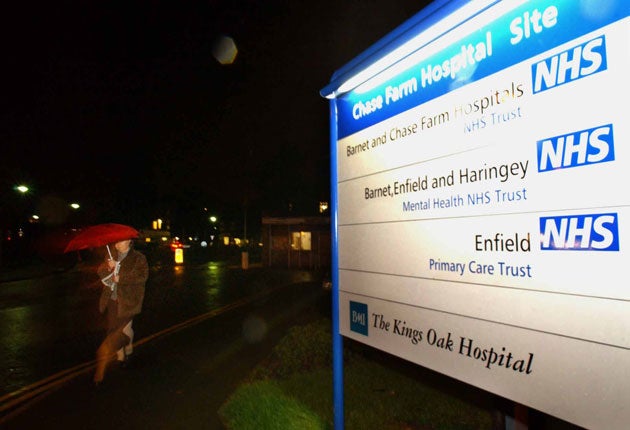Cuts put future of more than 50 hospitals at risk

The future of at least 50 hospitals is under threat from the unprecedented squeeze on NHS finances, evidence shows.
Alarm about cuts to services outweighs all other concerns for senior managers of NHS trusts as they struggle to balance their books, the NHS Confederation says. Worries about finances far outstrip concerns about implementing the Government's reforms, which some dismiss as a sideshow.
About 70 hospital trusts in England have failed to achieve the financial performance and quality of care necessary to become foundation trusts and "a significant number" have "large recurrent deficits", according to the King's Fund. In a report titled Reconfiguring Hospital Services the charity warned of "a downward spiral of falling income, growing deficit and declining quality [which] will cause hospitals to fail."
The head of a leading health management consultancy, who asked not to be named, said yesterday: "Our view is that about a third of [NHS trusts] are structurally in deficit – in other words there is a fundamental misalignment between patient demand, the cash available, the number of staff employed and the buildings used. The problem is that the Secretary of State is not prepared to face the consequences of significantly downsizing existing units."
Calculations by Health Service Journal show that at least 58 NHS hospitals will cease to cover their costs if cuts planned by primary care trusts to "low priority" treatments – such as tonsillectomies, injections for back pain and varicose vein surgery – go ahead.
The calculations are based on economic modelling by PricewaterhouseCoopers prepared for the Department of Health, intended to predict the impact of designating 226 procedures as low priority in PCT commissioning plans to free resources for essential treatments.
Ed Bramley-Harker, the director of health economics at PwC, said: "Many of the NHS trusts we have been talking to are reasonably confident about making short-term savings because they can see where efficiencies can be made. The challenge is the savings in years two and three and beyond. Those are likely to come from either stopping doing things or doing them in different settings."
Nine NHS foundation trusts are overspent and in breach of their terms of authorisation. They face possible takeover if they do not put their finances in order. Monitor, the NHS regulator, added Tameside to the list last week following its "failure to take appropriate and timely action to control operating costs".
A survey of NHS chairmen and chief executives published today shows that 63 per cent say cutting costs is among their top three priorities, with 31 per cent saying it will be the most important area. The findings are based on 254 respondents representing 30 per cent of NHS Confederation members.
Nigel Edwards, the confederation's acting chief executive, said the pressure of finding up to £20bn of efficiency savings over the next four years was now dominating managers' minds. "This is a warning for the NHS," he said. "It's a mammoth agenda and the dangers of distraction are obvious. We need to make sure we are providing care differently, not just top-slicing budgets." A Department of Health spokesman said: "We agree with the NHS Confederation that good patient care depends upon financial stability. That's why we're investing an extra £10.7bn into the NHS."
Critical: the imminent closures
* Accident and emergency, children's and maternity services at Chase Farm Hospital, Enfield. Approved by NHS London. Opposed by Nick de Bois, Conservative MP for Enfield North.
* Accident and emergency, and maternity services at King George Hospital, Ilford. Decision referred to Independent Reconfiguration Panel. Opposed by Lee Scott, Conservative MP for Ilford North, and Mike Gapes, Labour MP for Ilford South.
* Accident and emergency at Queen Mary's Hospital, Sidcup. Approved by NHS London. Opposed by Bob Neill, Conservative MP for Bromley and Chislehurst.
At least 22 other reconfigurations planned across the country.
Join our commenting forum
Join thought-provoking conversations, follow other Independent readers and see their replies
Comments
Bookmark popover
Removed from bookmarks